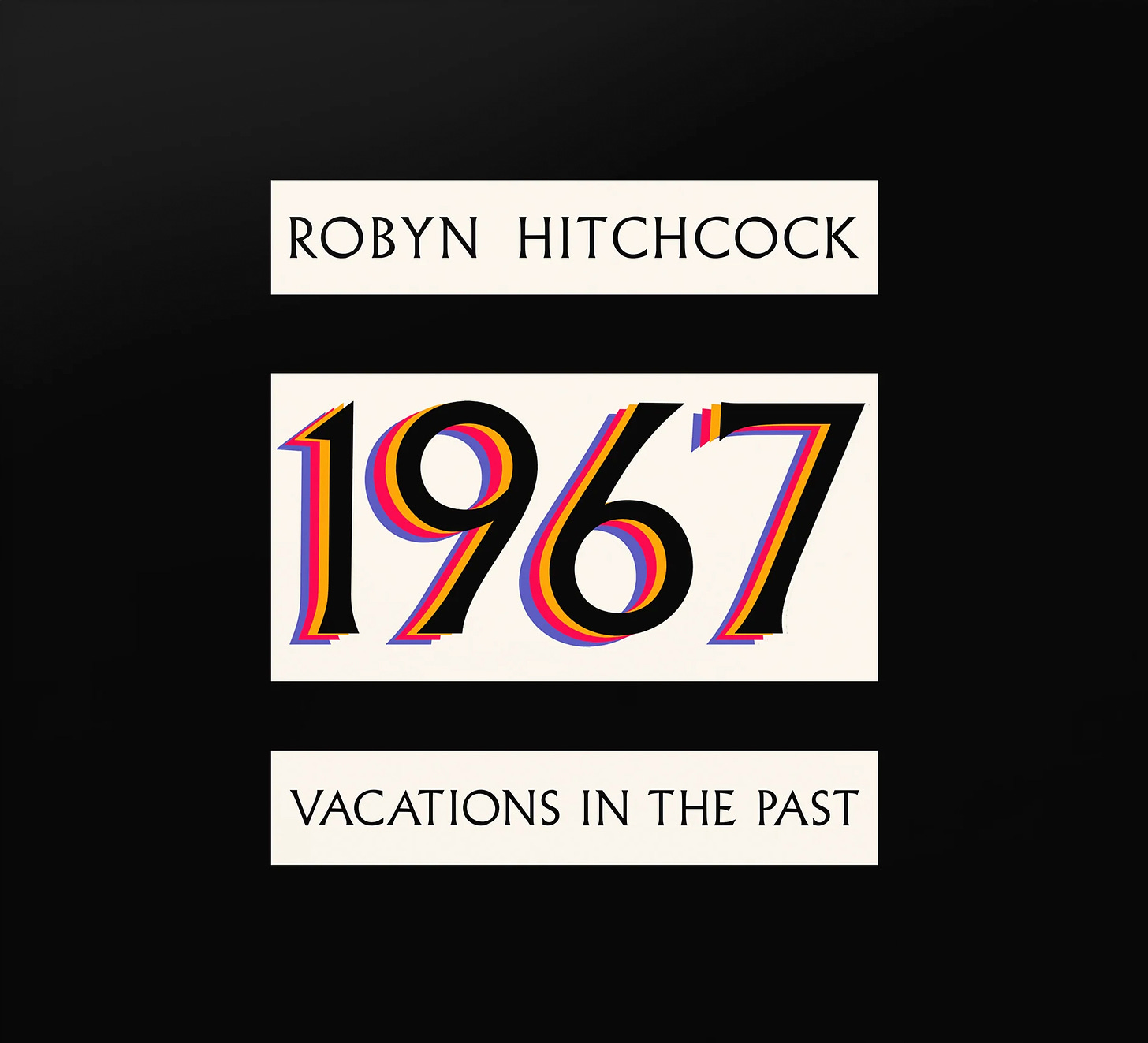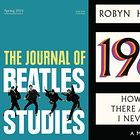Music: Robyn Hitchcock '1967 — Vacations in the Past'
A minimalist reimagining and companion to Hitchcock's memoir as the soundtrack of his youth, from The Beatles to The Kinks to Procol Harum
Groovers and pop-pickers, if you’re a reader of this publication, you know I know that you know that I know a little something about Robyn Hitchcock. A persona worthy of every adjective written for and by him, Hitchcock – in his 71st year – has now chosen this timeframe to write his memoir and pay compliment to that special year of 1967 in song. Which is what he should do. And has done.
But first, if you have not seen my book review of said memoir, hang on for a few minutes and read this. There’s another subject first (these guys called the Beatles, but there’s relevance to Hitchcock):
An appreciation for Hitchcock contains two “I Often Dream of Trains” thoughts (IYKYK). You might find this collection intriguing if you’re an aficionado of Hitchcock and his surrealistic and sardonic observations of life and love. If you’re interested in how the songwriter who gave us “My Wife and My Dead Wife,” “The Shapes Between Us Turn into Animals” and “Noirer Than Noir” pays tribute to the year 1967, you, my blessed friends, are in for a treat.
A portent to where he was headed began in 2023 with the release of the instrumental-only Life After Infinity and the death of his daughter Maisie from cancer in August. With that heartbreaking personal news, it now feels appropriate that Hitchcock would go back to a time of reflection and teenage awakening of the sounds that eventually propelled an introverted boarding school student into the musician that influenced R.E.M., The Replacements, The Pixies,
and pretty much all of mid-’80s ‘alternative’ music.The twelve-song tribute, which also includes the original title song (an India-style low-key pastiche that a 1967 George Harrison would approve of), vacillates between uncanny sound-a-like (Hitchcock’s eerie Lennonesque voice on “A Day in the Life” is staggeringly haunting), to the vocal purity of The Kinks’ “Waterloo Sunset” to the jaunty timbre-perfect Small Faces’ “Itchycoo Park.”
Itchycoo Park – Robyn Hitchcock/℗©Sony/ATV Music Publishing LLC/YouTube
At first glance, Procol Harum’s “Whiter Shade of Pale” looks out of place, certainly not an anthemic number that would be on Hitchcock’s bingo card. However, his delicate, near whisper with a harmony accompaniment by Emma Swift, captures each breath beautifully, as petals gently fall away to the wind.
Syd Barrett-era Pink Floyd steers itself into Hitchcock’s switchback lanes of twisty dreams courtesy of “See Emily Play.” One can imagine a teen Robyn playing this endlessly, meticulously figuring out the chords on a beat-up acoustic, trying to capture psychedelia on a six-string.
See Emily Play – Robyn Hitchcock/℗©Westminster Music Ltd./YouTube
And how could Hitchcock not cover the Jimi Hendrix Experience and one of the quintessential 1967 acid tunes “Burning of the Midnight Lamp” (a small caveat: it was released in 1968, but details) with the opening lyrics “The morning is dead/And the day is, too/There's nothing left here to meet me/But the velvet moon.”
“I Can Hear the Grass Grow” is an early Roy Wood single from his days in The Move which became a Top 5 hit on the UK’s Official Charts. The lyrics align with a book of fairy tales that Wood authored while in art school, but the delivery by Hitchcock has him in a higher register, grasping for something that’s just out of reach.
Hitchcock bounces back and low with a dark, slithery vocal on Scott McKenzie’s “San Francisco.” His transformative take pushes the trippy, stars-in-our eyes version off the scale. It is the antithesis of its original intention and has nuanced shades of an old man pointing his finger, threatening the hippies to get off his lawn.
If you mistake Hitchcock’s “My White Bicycle” for the hard rock band Nazareth’s cover (and you might), you’ll need to go back to the 1967 original by Tomorrow. More than the song, the behind-the-scenes fun facts are intriguing: The band was recording in EMI Studio 1 while the Beatles were in Studio 2 concocting Sgt. Pepper. John Lennon wandered over to listen and declared the song the “psychedelic anthem” to Melody Maker, making it an underground hit.
Tomorrow - My White Bicycle (1967)/℗©ACUM Ltd., Warner Chappell Music, Inc/YouTube
The delicate notes emanating from Traffic’s “No Face, No Name, No Number” perfectly match the aura that Hitchcock has given us in his later years. While this could be chalked up to life and love losses, the song nonetheless is wrapped in warm feelings and as a not-heard-often song from Traffic’s debut album, is given due justice by Hitchcock.
If there was the cover to cover by Hitchcock, it’s “Way Back in the 1960s” from The Incredible String Band. And while this is not the version from the album, I think it pretty much sums up why Hitchcock is who he is. For us.
Robyn Hitchcock and Joe Boyd – Way Back In The 1960s (The Incredible String Band) Live in Sydney 2011/℗© Warner Chappell Music, Inc/YouTube
As I noted, this may not be your cup of tea when it comes to dyed-in-the-wool Hitchcock narratives. Yet, considering it as a heartfelt homage and the overall sparse, delicate arrangements that neither smother nor slap the originals, it is truly a work from the heart.
Robyn Hitchcock – 1967: Vacations in the Past releases September 13 to all streaming platforms and can be pre-ordered here, in several physical variants including CD and colored vinyl (yellow, pink, and magenta) from tiny ghost records.







